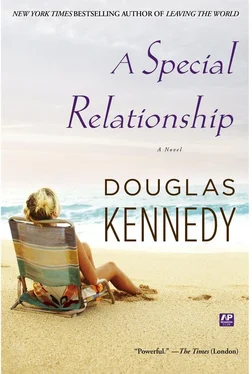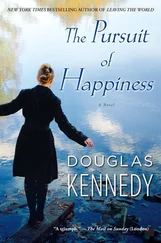'We've largely gone over to the French inquisitorial model when it comes to family law', Maeve explained to me when we met in her chambers, 'which means that, unlike the States, neither side can interrupt the other's examination of a witness unless it is absolutely crucial'. After the applicant's case had been presented, we would give our evidence. Then after our case was presented, there would be closing arguments. We'd go first, with Tony's barrister to follow. Then Maeve would be allowed to make a response, after which Tony's barrister would have the final word.
'And I know what you're going to say: that is completely unfair if you happen to be the respondent. Which is, I'm afraid, absolutely right. But that's how the system works - and there's precious little any of us can do about it. Except to make absolutely certain that they won't be able to pick apart anything we've presented to the court - which is my job'.
Whereas my job was to sit there and wonder if I'd ever live with my son again.
Maeve Doherty positioned herself in the front row of the courtroom. I sat with Nigel Clapp directly behind her. Tony's side had exactly the same seating arrangements. I glanced at my watch. 10.31 am. The judge had yet to arrive. I knew already from Maeve that the hearing would be closed to members of the public, so the visitors' pews at the back of the court would remain empty. But then, suddenly, the main door opened and I heard a very familiar voice say my name.
The voice was that of my sister, Sandy. I turned around. There she was, looking tired and disorientated, and dragging a roll-on suitcase behind her. I stood up, stunned. I said, 'What are you doing here?'
My tone wasn't wildly enthusiastic - and she picked up on this immediately.
'I just thought I should be here'.
Tony craned his neck, and appeared stunned to see her in court.
'What are you looking at?' she snapped at him, and he instantly turned away. Then she turned to me and whispered, 'Aren't you pleased I'm here?'
I gave her a quick hug and whispered, 'Of course, of course. It's just a shock, that's all. Did you just arrive?'
'Yep. Just took the subway in from Heathrow. I suppose you can find a bed for me for a couple of nights'.
I managed a small smile. 'I think that can be arranged. Who's looking after the kids?'
'You know my neighbours, the Fultons? Their two are away at summer camp, so it was no sweat for them to...'
But we were interrupted by the court clerk announcing: 'Please stand'. I motioned Sandy to find a pew, and I went racing back to my spot next to Nigel Clapp. He was already standing.
'My sister', I whispered to him.
'Oh... uhm... right', he said.
The rear door opened, and Mr Justice Charles Traynor walked in. He was in his early sixties. Large. Imposing. Well-upholstered. With a full head of steel hair and an imperial bearing that immediately let it be known he thought a great deal of himself. His three-piece black suit was immaculate. So too was his white shirt and a school tie which I guessed to be Eton (and which Maeve later confirmed to be correct). He took his place on the bench. He bowed to us, we bowed to him. He nodded for us to sit down. He removed a pair of half-moon spectacles from the breast pocket of his suit and placed them on his nose. He cleared his throat. The clerk called the court to order. Traynor peered out at us. I could see him catch sight of the lone visitor in the back row.
'And whom might you be?'
Nigel quickly whispered an explanation to Maeve Doherty, who rose and said, 'My Lord, that is the sister of the respondent, who has just arrived from the States to be with Ms Goodchild for the hearing. We ask the court's permission to allow her to stay'.
Traynor looked towards Lucinda Fforde.
'Does the applicant's counsel wish to raise any objections to this visitor?'
'One moment, please, My Lord', she said, then leaned back and had a quick sotto voce conversation with Tony and his solicitor. After a moment, she stood and said, 'We have no objections, My Lord'.
'Very well then - the visitor may stay'.
I avoided turning around and looking at Sandy right then - for fear she'd do something mildly triumphalist and well-meaning, like giving me the thumbs up.
Traynor cleared his throat. Then, without any fancy preamble or explanatory comments, he asked the applicant's barrister to begin presenting her client's case.
Lucinda Fforde stood up with a little bow of the head towards the bench, and began to speak.
'My Lord, having been in receipt of my statement, you are in no doubt aware that this is, without question, a desperately sad and tragic case...'
With that, off she went, painting a picture of an intensely successful professional man - Anthony Hobbs, 'one of the outstanding journalists of his generation' - who had found himself involved with a woman about whom he knew very little, and who became pregnant only a few short weeks into their liaison. Of course, Mr Hobbs could have played the cad and turned his back on this woman. Instead, upon learning of his transfer back to London, he asked if she would like to accompany him - and, in fact, regularize their situation through marriage. Now though there's no doubt that Ms Goodchild had a most difficult pregnancy, and also had to cope with a most severe postnatal depression, her behaviour became exceptionally erratic, to the point where...
And then - as in her opening at the Interim Hearing - she listed and embellished everything they had against me. My initial anguished statement in hospital that I didn't care if Jack lived or died. My increasingly erratic behaviour while at the Mattingly. My threat to kill him. The sleeping pill poisoning incident. My incarceration in the psycho ward. The wondrous steadfastness of my husband through all of this...
At which point, in the back of the court, there was a loud angry exhalation of breath. Sandy. Lucinda Fforde stopped in mid-speech, and craned her neck to see who caused this interruption. So did Maeve and Nigel Clapp, where Mr Justice Traynor simply peered over his bi-focals and asked, 'Did somebody say something?'
Sandy hung her head, avoiding all those accusatory eyes.
'See that it doesn't happen again', the Judge said crisply, in a tone that indicated the next time he would not be polite about it. Then he asked Lucinda Fforde to continue.
She picked up from where she left off, outlining Tony's decency, and how he stood by me even after I spoke of murdering our son, and how he turned, in despair, to his old friend, Diane Dexter, who offered shelter from the maniacal...
And so forth. And so on. I had to hand it to her: she was brisk. She was concise. She was tough. She left the listener in no doubt that I had turned infanticidal - and that, as horrible as it was to separate a mother from its child, there was no choice in this instance. To allow the child back with its mother now, she argued, would only put him back in renewed jeopardy - something, she was certain, the court didn't want to facilitate. Especially as the child was so happily settled with his father and Ms Dexter.
Now I had heard most of these arguments before. But it still didn't lessen the impact of hearing them again. Like all good barristers, Lucinda Fforde was a brilliant persuader - and one who, in clear, precise, rational language, turned me into a terrifying wretch who so didn't know what she was doing that she seriously considered killing her son.
It was now Maeve's turn to outline our case, and she did so with impressive lucidity and compactness - brevity (she told me) being one of the virtues that Traynor preferred. She began by quickly reminding the judge of my journalistic background, my long-standing work as a foreign correspondent with the Boston Post, my ability to cope admirably as a journalist and a woman in the Middle East. She then detailed, in about three sentences, my whirlwind romance with Mr Hobbs, falling pregnant at the age of thirty-seven, reaching that 'now or never' juncture that a woman approaching forty reaches on the question of motherhood, deciding to come with him to London, and then being hit with a nightmare pregnancy.
Читать дальше












